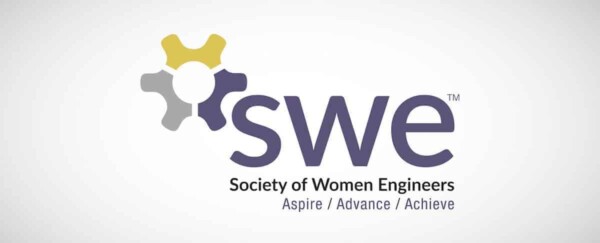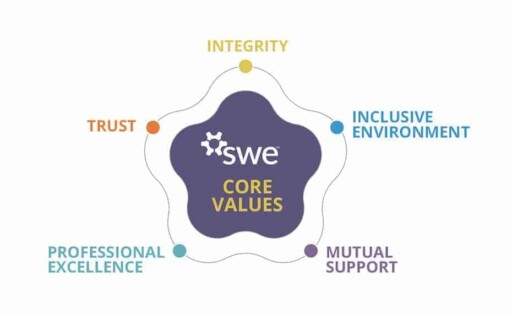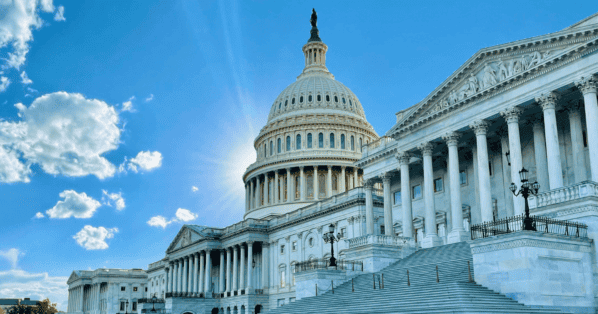The Society of Women Engineers held its annual Congressional Visit Day on April 14th this year. This blog was co-written by SWE members from New York who had the opportunity to meet with the offices of Senator Kirsten Gillibrand and Senator Chuck Schumer, share personal experiences, and advocate for bills supporting better inclusion for women in STEM.
What is the Congressional Visit Day and what bills are we supporting at SWE?
SWE advocates for policies that create equitable work environments for women engineers and fund STEM education through its public policy division. As part of SWE’s work with Congress, a number of SWE members typically travel to Washington, D.C. to meet with their lawmakers for Congressional Visit Day. This year, the Congressional Visit Day was virtual. As the New York delegation, nine of us met virtually with the offices of Senators Chuck Schumer and Kirsten Gillibrand, who are both advocates for education and women’s rights. In our meetings we shared our experiences with the Senators’ office, emphasized on bills that we championed, and underlined that when women engineers are supported we build the technologies and infrastructure needed to contribute to American prosperity and advancement.
SWE also sent a letter to all members of Congress detailing its key legislative priorities, specifically, championing acts such as the Equality Act, Paycheck Fairness Act, STEM Opportunities Act, Pregnant Workers Fairness Act, and the MSI STEM Achievement Act. Over the years, these visits and the resulting conversations between senators and constituents have produced increased funding for STEM education. Additionally, these visits have been cited as useful by lawmakers on both sides of the aisle, who gain deeper insights into how these policies will improve their districts, and affect their constituents.
A full list of SWE’s legislative priorities can be found on the Federal Bill Tracker. Our group was comprised of nine women engineers from New York of diverse backgrounds, different engineering disciplines and at different stages of their careers. We supported policies like the STEM RESTART Act which will help bring back women engineers who left the workforce, tapping into a larger pool of talent to grow the engineering field. Similarly, improved Title IX policies and bills like the Combatting Sexual Harassment in Science Act will help stop gender-based discrimination that disrupts the education and careers of women and minorities in STEM.
So why are these bills important to us?
For our group, based on our personal experiences and our backgrounds, some of the legislation was of particular interest:
Nabila, an undergraduate aspiring aerospace engineer, elaborating on her background reflects, “These policies are very personal to me due to me being a Bengali-American woman in STEM. It can be challenging for one to have a diligent support system, and I attended a male-dominated trade school that overlooked women in STEM. It wasn’t up until my senior year where I discovered a program that supports girls in STEM. However, it was late in my education journey to learn about this program but I am very grateful to have a mentor and wished that those like me are fortunate enough to have quality programs sooner. We don’t have enough representation for young women to pursue the STEM field and even outside of STEM. We wanted to ensure how significant it is for us to provide our issues with the upcoming vote! While I may be talking from my experience only, many like me face similar challenges. Senator Gillibrand’s support of expanding community school funding with the introduction of the Full-service Community School Expansion Act in March and a lot of her recent work involves the K-12. I hope that Senator Gillibrand can aid in America’s bright futures through equal opportunities for minorities and women!”.
Candace, an electrical engineering major, adds “These policies affect all women in STEM. It is personal to me, and it is to everyone else. I went to Brooklyn Technical High School, a specialized engineering school in the city that gave me the opportunity to not just pursue engineering, but to meet women who have succeeded in breaking into industry. Coming into this, I asked a few women what issues stuck most with them, and unanimously they all said childcare and gender harassment: two predominant issues that remove qualified women from the workforce. If through policies such as the Pregnant Workers Fairness Act and the Combating Sexual Harassment in Science Act, we prevent harassment and provide women equal opportunity to childcare and maternity leave, maybe we could level the playing field.”
Samantha, who studies software engineering agrees, “The policies that SWE is advocating for are extremely important. Being a woman in STEM can be very difficult and these policies are a step in the right direction.” she reflected, adding, “Most, if not all, women in STEM have experienced discrimination at some point in their education or career. I was fortunate to grow up in a school district that offered many hands-on technical courses, however it was clear that not all my peers wanted me in the classroom. I had male peers taking tools out of my hands and telling me that I couldn’t get my hands dirty. These interactions discouraged me but I also realized the need for more women in technology. I decided to pursue engineering not only for myself, but for all the young women who don’t know if they belong in engineering. Advocacy is crucial and part of my job with the Society Outreach Committee is to train adult advocates to lead effective outreach in their communities. It is my ambition that the work I continue to do will have an impact on the recruitment and retention of underrepresented students in STEM. I believe whole-heartedly that STEM is for everyone and policies like the 21st Century STEM for Girls and Underrepresented Minorities Act and the Equality Act are vital in ensuring that everyone feels welcome in STEM.”
Elaborating on the intersection of race and gender, Celine, a rising senior pursuing computer engineering, expands, “These policies are critical to ensure a strong pipeline of people who are underrepresented and underserved. It was important to me that these bills we are advocating for benefit not only women in engineering but also aid all disadvantaged minorities. I deeply believe in having more equitable education funding and ensuring that high-need schools are being advocated for.”
These bills affect more than just us engineers;
what’s good for women engineers is good for all workers, regardless of field.
As a group, we agreed that these bills were important not just for engineering and STEM, but for bettering inclusion across the board and for boosting our economy, which was particularly hit hard by the COVID-19 crisis. As with most global crises, women and under-represented minority groups were most impacted. It is reported that last year alone 2.5 million women left the workforce! Through intentional legislative action we can ensure that everyone is able to contribute to the rebuilding of our economies and communities.
Reflections on the visit and recommendations for fellow advocates:
For the majority of us in this cohort, it was our first time participating in a congressional visit. Here are four takeaways based on things that we as a group learned through our experience participating in the meeting virtually. We believe these may be helpful for future congressional visitors. (Feel free to also reach out to us to ask us about our experience!)
- Meet early with your group and prepare some talking points
- Asking for advice from those who have been on previous visits, on what to expect on SWE Congressional Visit Day is a good place to start. In our group, we had one member who had prior experience visiting the Hill and with advocacy. We were able to draw from her experiences and brainstorm talking points to drive the discussion. It is important to recall that this visit is a meeting and a conversation, not a presentation. So while it is great to be well prepared with talking points and facts and data, also be willing to listen and ask questions about why you are advocating and what you are advocating for. The objective is to engage in dialogue and allow for the representatives/officials to ask you questions and converse on details surrounding the many legislations.
- Learn about who you may be talking to
- Most congressional visitors to the Hill are provided details on who they will be talking with during their advocacy meet. Oftentimes, as was the case for our visit, officials from the Senators team meet with the constituents to learn about the causes they are passionate about. Researching the officers – their backgrounds, interests, training, can be helpful to discover common ground which is an effective way to plan for an engaging conversation.
- Share your personal stories and how you may be impacted by the bills
- While it may seem intimidating discussing and advocating for legislation without a background in policy, it is important to understand that one’s voice and experiences are important and valued in such meetings. Sharing personal stories help the policy makers reflect on what works and why it may be important to their constituents. Read about the bills that you support, and then reflect on how you or people you know may be impacted by these legislations. Communicating these reflections based on personal experiences can help the law-makers get critical insights into how they can better help their constituencies.
- Follow up with a ‘thank you’ email/letter
- Just like after a job interview, ‘thank you’ letters are effective after advocacy work. These can be snail mail or email sent to the person that you met with, reiterating the gist of the meeting. These follow-up emails are a good way to re-emphasize certain key points, and also provide the opportunity to provide additional resources and links that may have only been briefly touched upon during the meeting. For our letters, we regrouped as a team after the meetings to discuss the main take-aways which we then drafted into a letter. We also added links to SWE resources to help the officials glean more information, if they so desired.
Did you miss the SWE Congressional Visit this year? If you are within the United States, you can still take action and advocate virtually by using SWE’s resources. One way to do so is to find contact information for your representative and senators, and copy, paste, and update (with the name of your official and your contact information) this core message into an email to them to show your support for SWE’s advocacy agenda. Advocacy is integral to ensuring that legislation supports the creation of inclusive environments worldwide, where women are able to thrive and contribute at their best.
It is important to also remember that advocacy does not end with one Congressional visit nor one conversation with a house representative or senator, although these conversations are great starting points for advocacy.
It is integral to our communities that we continue advocating by consistently showing up and being vocal and anti-racist through conversations in-person and on social media and by doing due diligence to stay politically aware and informed at all times.
Here are some pictures from our virtual visit:
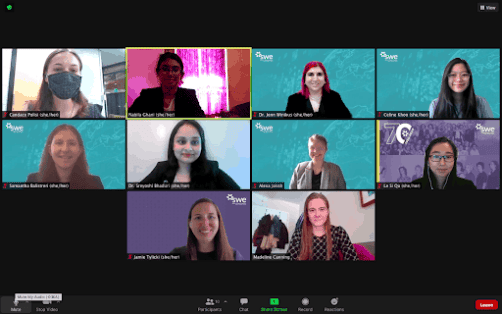
Day 1. The group met with Madeline Canning from Kirsten Senator Gillibrand’s office, virtually on April 14th.

Day 2. The group met with Ramon Carranza from Senator Chuck Schumer’s office, virtually on April 15th.
Authors:
 Dr. Sreyoshi Bhaduri is a SWE member and Vice President at SWE-NY. She currently leads Global People Research and Analytics at McGraw Hill, where she works on research leveraging organization data to generate data-driven insights for decisions impacting Culture and Talent. Learn more about her work at www.ThatStatsGirl.com.
Dr. Sreyoshi Bhaduri is a SWE member and Vice President at SWE-NY. She currently leads Global People Research and Analytics at McGraw Hill, where she works on research leveraging organization data to generate data-driven insights for decisions impacting Culture and Talent. Learn more about her work at www.ThatStatsGirl.com.
 Le Si Qu (she/her) has been involved in the Society of Women Engineers (SWE) for the past five years at the section and society level. She was the founding Co-Lead for the Asian Connections AG and currently serves as the FY21 Lead. Le Si is a mechanical engineering student at Stony Brook University.
Le Si Qu (she/her) has been involved in the Society of Women Engineers (SWE) for the past five years at the section and society level. She was the founding Co-Lead for the Asian Connections AG and currently serves as the FY21 Lead. Le Si is a mechanical engineering student at Stony Brook University.
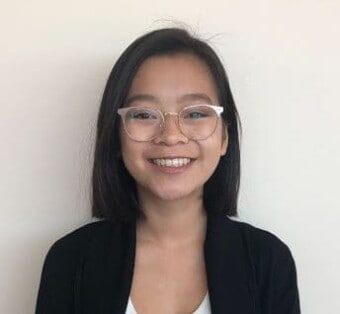 Celine Khoo has been involved with SWE since 2017, she currently serves as the Membership Director at her section at Drexel University where she is a rising senior pursuing a B.S. in computer engineering and an M.S. in electrical and telecommunications engineering. Celine is an FPGA and Software Development Co-op at MIT Lincoln Laboratory and is on the Advanced Track of the SWE Leadership Development Program.
Celine Khoo has been involved with SWE since 2017, she currently serves as the Membership Director at her section at Drexel University where she is a rising senior pursuing a B.S. in computer engineering and an M.S. in electrical and telecommunications engineering. Celine is an FPGA and Software Development Co-op at MIT Lincoln Laboratory and is on the Advanced Track of the SWE Leadership Development Program.
 Candace Polisi has been a SWE member since 2017. She is the Treasurer and upcoming President of her section at Binghamton University where she is currently an electrical engineering student. She has an internship this summer at Lockheed Martin RMS.
Candace Polisi has been a SWE member since 2017. She is the Treasurer and upcoming President of her section at Binghamton University where she is currently an electrical engineering student. She has an internship this summer at Lockheed Martin RMS.
 Alexa Jakob serves as co-lead of SWE’s LGBTQ+ and Allies Affinity Group and the President of the section at Cooper Union, where she studies electrical engineering with a focus on signals and minors in computer science and philosophy. A Goldwater Scholar and SWE scholarship recipient, she has been a SWE member since 2019 and received the 2021 WELocal Rising Star Award. Alexa interned at NVIDIA in hardware engineering in 2020 and will return this summer.
Alexa Jakob serves as co-lead of SWE’s LGBTQ+ and Allies Affinity Group and the President of the section at Cooper Union, where she studies electrical engineering with a focus on signals and minors in computer science and philosophy. A Goldwater Scholar and SWE scholarship recipient, she has been a SWE member since 2019 and received the 2021 WELocal Rising Star Award. Alexa interned at NVIDIA in hardware engineering in 2020 and will return this summer.
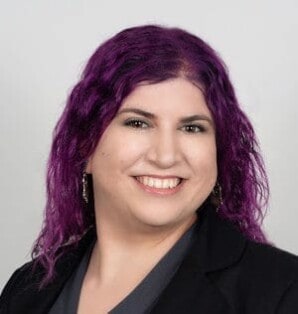 Dr. Jennifer Winkus is an Assistant Professor of Teaching at the University at Buffalo in the Department of Computer Science and Engineering with a research focus on Engineering Education and K-12 Outreach. Currently she is the FY21 Chair of the WE Local North America Local Advisory Board, Outreach Chair for the WNY Section of SWE, Faculty Advisor to the UB Section of SWE, and is also a member of the Society Women in Academia and Curriculum Committees. She is a Life Member and has been a SWE member since 2013.
Dr. Jennifer Winkus is an Assistant Professor of Teaching at the University at Buffalo in the Department of Computer Science and Engineering with a research focus on Engineering Education and K-12 Outreach. Currently she is the FY21 Chair of the WE Local North America Local Advisory Board, Outreach Chair for the WNY Section of SWE, Faculty Advisor to the UB Section of SWE, and is also a member of the Society Women in Academia and Curriculum Committees. She is a Life Member and has been a SWE member since 2013.
 Jamie Tylicki is a Technology Consulting Manager at Accenture in New York City, focusing on large-scale banking platform implementations for financial institutions in North America and globally. A 2012 graduate of The Ohio State University College of Engineering, Jamie has been a SWE member since 2008, holding a variety of positions as a collegiate and professional at the section, region, and society levels.
Jamie Tylicki is a Technology Consulting Manager at Accenture in New York City, focusing on large-scale banking platform implementations for financial institutions in North America and globally. A 2012 graduate of The Ohio State University College of Engineering, Jamie has been a SWE member since 2008, holding a variety of positions as a collegiate and professional at the section, region, and society levels.
 Samantha Balistreri has been a member of the SWE since 2017 and is a senior studying software engineering. She is the Society Outreach Committee Training and Development lead and a member of her section’s Introduce a Girl to Engineering Workshop Committee. Samantha has co-oped at Collins Aerospace and will be interning at The Boeing Company this summer.
Samantha Balistreri has been a member of the SWE since 2017 and is a senior studying software engineering. She is the Society Outreach Committee Training and Development lead and a member of her section’s Introduce a Girl to Engineering Workshop Committee. Samantha has co-oped at Collins Aerospace and will be interning at The Boeing Company this summer.
Nabila Ghani is an aspiring aerospace engineer, an undergraduate student, and founder of B3 You, her magazine company. She is an officer, member, and social media manager of the Society of Women Engineers at Valencia State College, West Campus. She is also a national SWE advocate.
Author
-

SWE Blog provides up-to-date information and news about the Society and how our members are making a difference every day. You’ll find stories about SWE members, engineering, technology, and other STEM-related topics.


